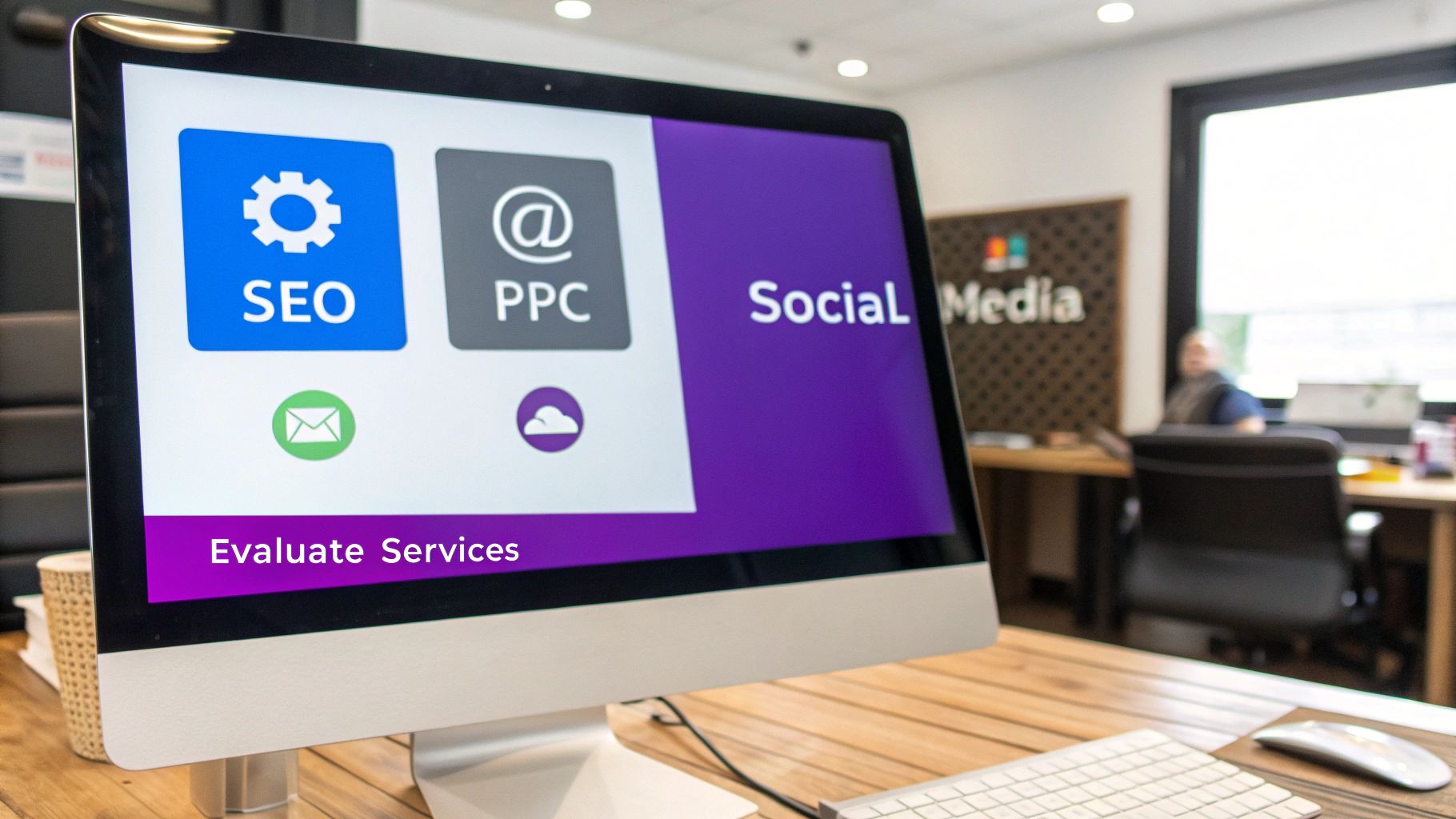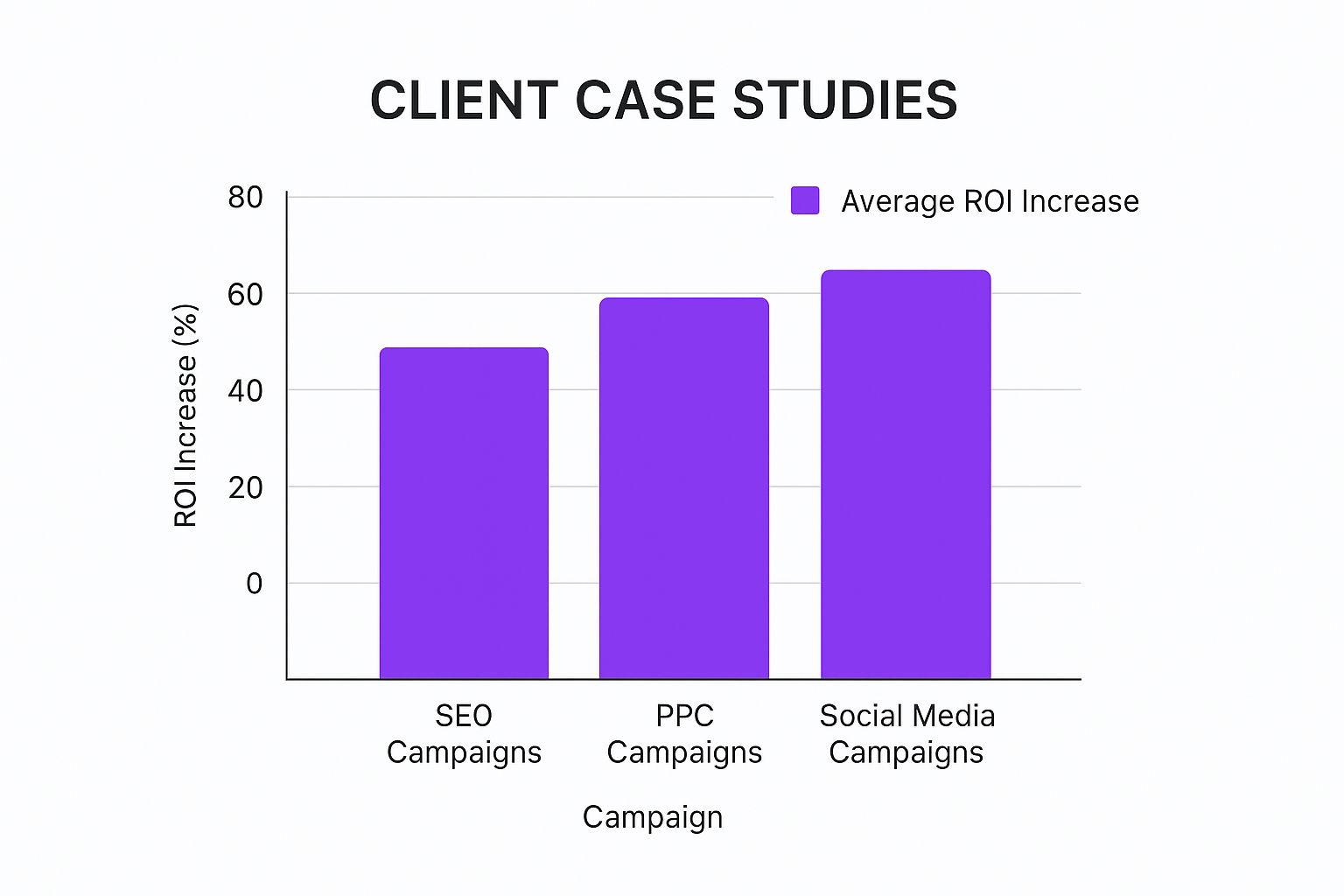How to Choose a Digital Marketing Agency: Expert Tips
Hiring a digital marketing agency is a big move. Before you even think about sending that first email or booking a discovery call, the most critical work has to happen in-house. It’s less about finding the right agency and more about knowing yourself first.
Without a clear destination, any road will get you there... and you'll probably waste a ton of time and money in the process.
Define Your Goals Before You Start the Search

Here’s a hard truth: vague goals are the #1 killer of agency partnerships.
An objective like "grow our social media" is basically meaningless. A real goal sounds more like, "increase Instagram engagement by 15% and generate 50 qualified leads per month through targeted Facebook Ads." See the difference? That clarity turns your agency search from a guessing game into a strategic mission.
Pinpoint Your Business Objectives
First, ask yourself what success actually looks like for your business in the next 6-12 months. Are you trying to build brand awareness from the ground up in a new market? Or do you need to drive immediate sales for a specific product line?
Each of those goals requires a totally different marketing playbook—and a different kind of agency.
Let’s break down how common business goals translate into actual marketing needs:
- You need to increase revenue: This probably means you need an agency that’s a beast at conversion rate optimization (CRO) for your website or can run aggressive PPC campaigns to snag buyers who are ready to pull the trigger.
- You need to generate more leads: Your focus shifts to content marketing and SEO to pull in organic traffic. Or maybe you need an expert in creating killer lead magnets for social media to build that email list.
- You need to improve brand awareness: This goal points toward PR, influencer collaborations, and broad-reach social media campaigns that are all about getting eyeballs and engagement, not direct sales.
- You need to boost customer retention: Here, the right partner would specialize in email marketing automation, loyalty programs, and creating content that builds a real community.
A great partner will help you refine your strategy, but you absolutely cannot hire an agency to figure out your goals for you. You have to walk into the conversation with a clear vision of what you want to achieve. This is non-negotiable.
Before you even start looking, it's a good idea to have some clear internal answers. This simple checklist can help you frame the conversation and make sure you're ready to find the right partner.
Key Questions to Ask Before Hiring an Agency
| Business Goals | What specific, measurable outcome do we need in the next 6-12 months? | This moves you from "we need more traffic" to "we need to increase qualified leads by 20%." |
|---|---|---|
| Budget | What is the absolute maximum we can realistically invest per month, including ad spend? | This determines the caliber and scope of agencies you can realistically consider. |
| Target Audience | Who is our ideal customer, and where do they spend their time online? | A mismatch here means wasted ad dollars and content that falls on deaf ears. |
| Internal Resources | Who on our team will manage the agency relationship and provide assets/feedback? | Agencies need a dedicated point of contact to be successful; they can't operate in a vacuum. |
| Past Experiences | What worked (or didn't work) with past marketing efforts or agencies? | Understanding past failures helps you avoid repeating them and find a partner who fills those gaps. |
Having these answers ready will instantly make your initial conversations with agencies more productive and help you quickly weed out the ones that aren't the right fit.
Align Your Goals with a Realistic Budget
Once your objectives are crystal clear, you have to put a number on them. Your budget is the great equalizer—it determines the type of agency you can hire.
A small business looking to spend $2,000 a month is a perfect match for a specialized boutique agency. On the other hand, a company with a $20,000 monthly budget can bring on a larger, full-service firm.
Knowing how to create a digital marketing strategy is a huge advantage here, as it helps you figure out where your money will make the biggest impact. Be brutally honest about what you can afford. It ensures you find a partner who can deliver real results without breaking the bank.
How to Look Under the Hood: Vetting an Agency’s Real Capabilities

A slick sales pitch and a glossy portfolio can be hypnotic. But behind the curtain, is there real technical and creative horsepower? To truly figure out how to choose the right digital marketing agency, you have to look past the presentation and poke around the engine room.
The promises made on a discovery call need to be backed by tangible proof and a forward-thinking approach. An agency still clinging to old-school methods is already running a lap behind.
Question Their Use of Technology and AI
Modern marketing isn't just about clever copy; it's about the intelligent application of technology. The explosion of AI has fundamentally rewired how winning strategies are built and executed. When you're talking to a potential agency, ask them straight up how they’re weaving AI into their SEO and content workflows.
Their answer will tell you everything you need to know. A recent survey of over 220 agency leaders found that a whopping 73% agree Generative AI has radically transformed the search game. This means your agency partner must be using AI to build out things like Q&As and structured data to nail user intent faster than the competition.
A modern agency should be able to rattle off the specific AI-powered tools and workflows they use. Vague hand-waving about "using AI" is a massive red flag. Press them for details on how technology gives their clients a real competitive edge.
Vet Their Case Studies and Portfolio
Case studies are an agency’s highlight reel, but you need to watch with a critical eye. Don't just get starstruck by big-name logos; dig into the specifics to see if their past wins are actually relevant to your challenges.
A huge part of this is seeing how transparent they are about results and how they help you measure marketing ROI. Look for case studies that clearly lay out the initial problem, the strategy they rolled out, and—most importantly—the cold, hard numbers that prove it worked.
When you're flipping through their work, ask yourself:
- Is the industry a match? Crushing it for a B2C ecommerce brand doesn't automatically mean they'll know how to drive B2B leads.
- Was the client's size similar to mine? The playbook for a Fortune 500 company is worlds away from a startup's needs.
- Are the results specific? "Increased traffic" is lazy. "Boosted organic leads by 45% in six months" is a real result.
Dive deep into their portfolio. For a great collection of projects that show how real challenges were turned into victories, you can explore some detailed case studies in digital marketing.
Evaluate Their Creative and Strategic Vibe
Finally, you need to gut-check if their creative style and strategic brain align with your brand. Look at their past campaigns, the websites they've designed, and their social media content. Does their tone feel like something your company would actually say?
This is way more than just aesthetics. It’s about finding a partner who just gets your brand on a gut level. An agency can have all the technical chops in the world, but if their creative vision clashes with yours, the partnership will feel like a constant battle.
Here’s a pro tip: schedule a meeting to brainstorm a hypothetical campaign for your brand. See what initial ideas they throw out. This simple test can reveal more about your compatibility than any case study ever will.
Verifying Their Track Record and Reputation

Let's cut to the chase: an agency's past is the single best predictor of your future. A slick proposal and a killer pitch mean nothing if they can’t back it up with a history of real, tangible results.
Digging into an agency's track record isn't just about checking boxes; it's about protecting your investment and your time. This is where you separate the talkers from the true performers who actually deliver on their promises.
Reading Between the Lines of Case Studies
Case studies are, by nature, highlight reels. They're curated success stories designed to impress. But if you know what you’re looking for, they contain valuable clues about how an agency really operates.
Don't get dazzled by the big, shiny numbers. Look for details that mirror your own business challenges. Sure, growing an e-commerce store's revenue by 300% is impressive, but is that strategy even remotely relevant to your B2B lead generation goals?
Specificity is your best friend here. Vague claims like "increased website traffic" should set off alarm bells. A strong case study will offer hard numbers and context, like "drove a 45% increase in qualified organic leads within six months for a SaaS client." Now that's a story worth hearing.
Speaking with Real Client References
This part is absolutely non-negotiable. If an agency gets cagey about providing references, consider it a giant red flag. They're probably hiding something.
When you get a past or current client on the phone, you have a golden opportunity to get the unfiltered truth. Don't waste it with softballs like, "Were you happy with them?"
Get specific. Dig into the day-to-day reality of the partnership:
- Communication: "How responsive was your main point of contact? Were reports actually clear and delivered on time, or did you have to chase them down?"
- Adaptability: "Can you tell me about a time things didn't go as planned? How did the agency handle a challenge or a sudden market shift?"
- Transparency: "Did you always understand their strategy and why they were making certain decisions? Or did it feel like a black box?"
The answers to these questions will reveal far more about the client experience than any polished PDF ever could. A great agency will have a roster of clients ready and willing to sing their praises.
Remember, you are hiring a partner, not just another vendor. How they communicate and integrate with your team is just as critical as their technical skills.
Seeking Third-Party Validation
Okay, so the agency's materials look good and their hand-picked references say nice things. What is the rest of the industry saying about them? This is where you look for unbiased, third-party proof that their reputation is the real deal.
Finding a trusted local partner can be a great place to start, as they have a reputation to uphold right in your community. You can dive deeper into finding a top-tier digital marketing agency near me in our detailed guide.
Look for credible signals of expertise and industry recognition. Things like authentic online reviews on platforms like Clutch or Google, legitimate industry awards, and professional certifications all build a complete picture. These elements show that their work has been vetted and validated by people outside their own four walls.
Assessing Their Expertise in Modern Channels
Your audience isn’t just on Google anymore. They’re scrolling, sharing, and shopping on a dozen different platforms. When you’re vetting a digital marketing agency, you have to find a partner who understands where your customers actually live online—and can meet them there with a message that connects.
This goes way beyond just posting on social media. It’s about understanding the nuances of TikTok versus LinkedIn and knowing how to build authentic relationships through influencer marketing rather than just paying for a shout-out.
Social Media Beyond the Basics
A modern agency’s social media strategy should feel less like broadcasting and more like a conversation. They need to prove they can do more than just schedule posts; they have to show a deep understanding of platform algorithms, content formats, and community engagement.
Their skill with newer channels is a dead giveaway of how adaptable they are. A significant 59% of marketers are planning to increase their influencer partnerships, which tells you exactly where the industry is headed. This is even more critical for younger audiences—social media influences the purchase decisions for a staggering 90% of Gen Z consumers.
In fact, the entire search landscape is shifting. For many, social media has become the new Google.
The table below breaks down just how dramatically Gen Z's information-seeking habits have changed compared to the general population, underscoring why your agency needs to be an expert in social search.
| Information Source | Percentage of Gen Z Users | Key Takeaway for Businesses |
|---|---|---|
| Social Media | 41% | Social platforms are now primary search engines for discovery and validation. An agency must have a strong social commerce and SEO strategy. |
| Traditional Search Engines | 33% | While still important, Google is no longer the undisputed starting point for the next generation of consumers. |
As you can see, 41% of Gen Z now uses social media as their primary source for purchase information, officially overtaking traditional search engines. You can dig into more of these stats in this insightful report.

This data shows that while SEO and PPC deliver powerful returns, social media is right there with them. A multi-channel approach isn't just a good idea; it's essential for survival.
Vetting Their Influencer Marketing and Social Commerce Skills
Influencer marketing has grown up. It's no longer a trend; it's a fundamental marketing pillar. A capable agency won’t just find influencers with big follower counts; they’ll identify partners whose audiences are a perfect mirror of your ideal customer.
Ask them to walk you through their process. Get specific.
- Vetting Influencers: How do they verify an influencer's engagement rates and audience demographics? Do they use tools? What red flags do they look for?
- Campaign Strategy: What’s their experience with different partnership models, like long-term brand ambassadorships versus one-off campaigns? Which do they recommend and why?
- Measuring Success: How do they track the ROI of influencer collaborations beyond fuzzy metrics like reach and likes? Ask for real examples.
Their answers should reveal a strategic, data-backed approach, not just guesswork.
A great agency sees social media as a revenue driver, not just a brand-building tool. They should be talking about social commerce features, like shoppable posts and in-app checkout, as a core part of their strategy.
Ultimately, you need to look at their technical foundation. It's crucial to understand their grasp of modern marketing automation best practices to see if they can actually nurture the leads they generate from all these channels. This combination of creative social strategy and solid technical execution is what separates a good agency from a great one.
Understanding Pricing Models and Contracts
Let's talk money. Agency proposals can feel like they're written in a different language, full of jargon and legal clauses that make your eyes glaze over. It’s easy to get bogged down in the details and forget the one thing that actually matters: are you getting real value for what you’re paying?
Figuring out the financial side of things is a massive part of choosing the right agency partner. If the numbers don't work, nothing else will. So, let’s break down the common ways agencies charge and what to watch for in the fine print.
Decoding Agency Pricing Structures
Most agencies use one of three main pricing models. None of them are inherently "better" than the others; the right one for you comes down to your specific needs, the scope of the work, and how predictable you need your budget to be.
- Monthly Retainer: This is the most common setup for ongoing work like SEO, content creation, or social media management. You pay a flat fee every month for a pre-agreed set of services. It’s great for budget predictability, but you have to be crystal clear on the deliverables to avoid "scope creep," where you end up paying the same for less and less work over time.
- Project-Based Fee: Perfect for one-and-done jobs, like a website redesign, a branding overhaul, or a specific product launch campaign. You pay a single, fixed price for a clearly defined project. It's wonderfully straightforward, but it offers little flexibility if you need to pivot or add something halfway through.
- Hourly Rate: This is often used for consulting, strategy sessions, or smaller, ad-hoc tasks that pop up. You’re billed for the actual time spent on your account. While it's flexible, it can be a nightmare to budget for and sometimes doesn’t exactly encourage the agency to work efficiently.
Speaking of hourly billing, it helps to know what’s normal out there. Agency rates have been on the rise. Recent industry data shows that 36% of agencies are now charging between $175-$199 per hour, with another 32% in the $200-$249 range. Knowing these benchmarks helps you spot if a quote is fair, a bargain, or way out of line. You can dig deeper into these numbers in the 2025 Digital Agency Industry Report.
Scrutinizing the Contract and Proposal
Okay, you've got a proposal in your hands. Now the real work begins. You need to look past the shiny graphics and attractive price tag and get into the nitty-gritty of the contract. This is where you protect your business and set the ground rules for the entire relationship.
A great agency proposal does more than just list services and prices. It tells a story. It should clearly connect every single line item back to the business goals you talked about, showing you a direct path from their work to your ROI.
When you’re reviewing that contract, put on your detective hat and pay super close attention to these critical areas:
- Scope of Work (SOW): This needs to be brutally specific. A line item for "SEO services" is a red flag—it’s way too vague. A good SOW will detail the exact deliverables, like "monthly technical site audit, creation of four 1,500-word blog posts, and outreach to secure 10 high-authority backlinks." The more detail, the better.
- Termination Clause: What happens if things go south? Look for a reasonable notice period, usually 30 to 60 days. Run screaming from any contract that tries to lock you into a 12-month commitment with no escape hatch. You need an out if the partnership isn’t working.
- Ownership of Work: This is a big one. The contract must state, without ambiguity, that you own 100% of everything created for you. This includes all creative assets, website code, ad accounts, and campaign data. This is completely non-negotiable.
- Reporting and Communication: How will you know if they're actually doing a good job? The contract should spell out how often you’ll get reports, what metrics they’ll include, and the cadence for meetings. It should also list the key performance indicators (KPIs) that will be used to measure success.
So, What Are the Big Questions Left?
You've done the hard work. You’ve sifted through proposals, sat through presentations, and narrowed your list down to a couple of top contenders. Now comes the final gut-check.
This is where you move past the sales pitch and get into the nitty-gritty of what a partnership will actually look like. Getting straight answers now is the difference between a dream team and a six-month headache. Let's tackle the questions that always come up at this stage.
What Red Flags Should I Look For?
A great agency feels like a partner. A bad one feels... well, sketchy. After years of seeing both sides, I can tell you the warning signs are usually pretty clear if you know what to look for.
Be extremely wary of anyone who guarantees results. I’m talking about promises like, "We'll get you the #1 spot on Google in 90 days!" Nobody can guarantee that. Digital marketing has way too many moving parts, and anyone who says otherwise is either naive or selling snake oil.
Another huge red flag is a total lack of transparency. If an agency gets cagey when you ask for client references, won't give you direct access to your own campaign data, or can't explain their strategy without hiding behind a wall of jargon, run. It often means they're obscuring poor performance or using a black-box approach you'll have no control over.
And finally, watch out for bargain-basement pricing. If a quote seems too good to be true, it almost certainly is. Rock-bottom prices usually mean inexperienced teams, cookie-cutter strategies, or outsourced work that won't get you anywhere.
How Long Should an Agency Contract Be?
This is a big one. You don't want to get locked into a year-long commitment before you even know if the agency can deliver.
Most reputable agencies will start with an initial contract of three to six months. Think of it as a trial period. It’s long enough for them to get strategies off the ground and for you to see some real, measurable momentum. It also gives both of you an out if the chemistry just isn't there.
After that initial phase, it’s common to move to a 12-month agreement or, my personal favorite, a flexible rolling contract. A rolling agreement, which usually requires a 30- or 60-day notice to cancel, offers the perfect blend of stability for the agency and freedom for you.
The right contract length protects everyone. It gives the agency the runway they need to produce meaningful results, but it gives you the agility to pivot if the partnership isn't driving the value you expected.
Should I Choose a Niche or Generalist Agency?
Ah, the classic specialist vs. generalist debate. The right answer really depends on your business and what you're trying to achieve.
A niche agency—one that focuses exclusively on your industry, like SaaS, e-commerce, or healthcare—hits the ground running. They already speak your language, know your audience’s deepest pain points, and understand the competitive landscape inside and out. That deep domain expertise can seriously accelerate your results.
On the other hand, a generalist agency brings a much broader perspective. They’ve seen what works in a dozen different industries and can cross-pollinate ideas that a specialist might never think of. That outside-the-box thinking can be a huge creative advantage.
So, how do you choose? If your business operates in a highly regulated field or faces very specific industry challenges, a niche specialist is often the safer, more effective bet. But if you're looking for a wide array of services and a fresh strategic approach, a generalist might be the perfect fit.
At Rebus, we bring the best of both worlds—deep expertise in key verticals combined with a broad strategic vision that drives real, measurable growth. Ready to work with a team that’s as obsessed with your success as you are? Visit us to learn more and see what a true partnership looks like.

